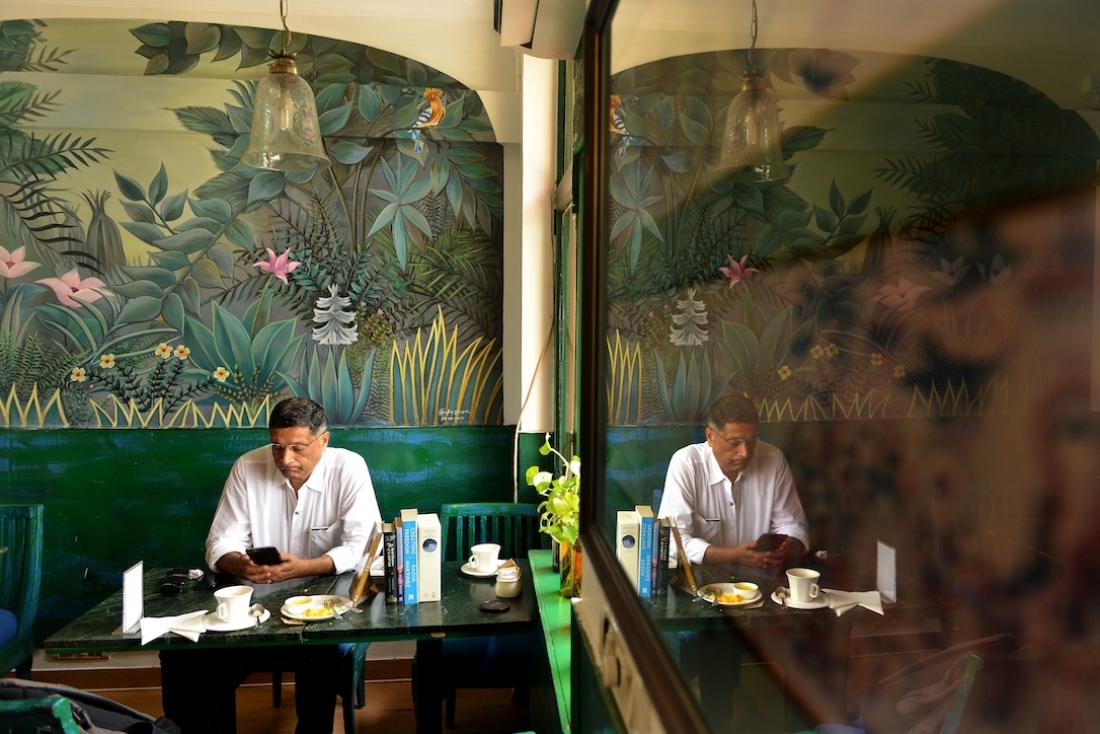
Arvind Subramanian in a cafe, Khan Market, New Delhi

Arvind Subramanian in a cafe, Khan Market, New Delhi
Economics can be a boring subject, but for the former chief economic advisor to the government of India, author and a jury member of the JCB Prize for Literature, it is a subject as interesting as good fiction, and closely related with it. ‘I think striking a balance is the biggest challenge.’ We ask Arvind Subramanian what defines good writing for him, the role of literature in a country’s economic development and the inextricable political narrative of our times.
What is your relationship with books? Do you remember the first book you may have picked back in school?
I was a late reader. I only started reading when I was 12 or 13. And then I realised I had fallen so far behind, I thought, “Oh my god! I have to catch up!” That’s how it began. My initial list of books was from my brother who was studying in college in Delhi.
How do you see the relationship between Economics and Literature?
I would like to quote this book, Beyond A Boundary, "What do they know of cricket, who only cricket know!". It similarly goes for Economic Development, “What do they know of economics who only economics know?” So you have to know the past, and know good fiction.
Why is the JCB Prize an important milestone in Indian literature and what is your effort while judging the entries – what do you look for in a winner?
I think the idea is to encourage good writing, and good Indian fiction. And to encourage good translation from regional languages. The goal is to also create some system of incentive. The prize is also given to writing in the vernacular language. And in times where reading fiction is under threat, one would like to stall/avert that trend. Prizes do have some effect in that direction.
Economics is a field of objectivity while literature is one of subjectivity – is it a challenge to travel between both the ends of the spectrum?
You know, economics is hard science, the dominant tools are math and evidence and data. And you know, Economic Development has to be broader since the phenomenon comes from all fields. For instance, the Nobel Prize winners Abhijeet Banerjee, Esther Duflo and Michael Kremer also have some form of passion, and some form of subjectivity. One can try to make a distinction, but in reality they complement each other.
Five writers you would like to put around a table for a combustible and stimulating conversation.
George Elliot, Herman Melville, V.S. Naipaul, Shakespeare, Tayeb Salih, Joseph Conrad and of course, J.K. Rowling (I’m a big fan of the Harry Potter series!)
One book that feels closest to your life.
I think it will be the poem Ulysses by Tennyson.
You have written prolifically during the course of your service – what, for you, has been the biggest challenge about writing?
Writing is something you have to work hard at. Nobel Prize Winner Arthur Lewis used to say, “Rewrite! Rewrite! Rewrite!” So you have to keep at it. And of course, you have to read a lot. Reading is fundamental to writing. And the important concern is, how do you make things accessible and catchy while also keeping them serious. I think striking that balance is the biggest challenge. And I try to do that by keeping things witty and catchy. For instance, there is this chapter in my book where I am talking about Universal Basic Income which I titled, A Conversation with and within the Mahatma. Economics as a discipline can get really dry, I think it is important to keep things interesting.
No writing is far removed from the politics of a certain time – would you agree or disagree?
I think it is trivially true. The great art is how you can make a moment in time transcend time. So it is important to write in the moment and not for the moment. I think all great fiction must transcend time.
What is your vision ahead for the JCB Prize and rewarding good literature in the country?
I think the hope is that the prize gains traction, and becomes a major event on the literary calendar. I don’t think people write for a prize, people write to write. I hope the prize doesn’t act as an incentive, but perhaps as a reward and creates an ecosphere that makes discussions about literature more pervasive.
Words Muskan Nagpal